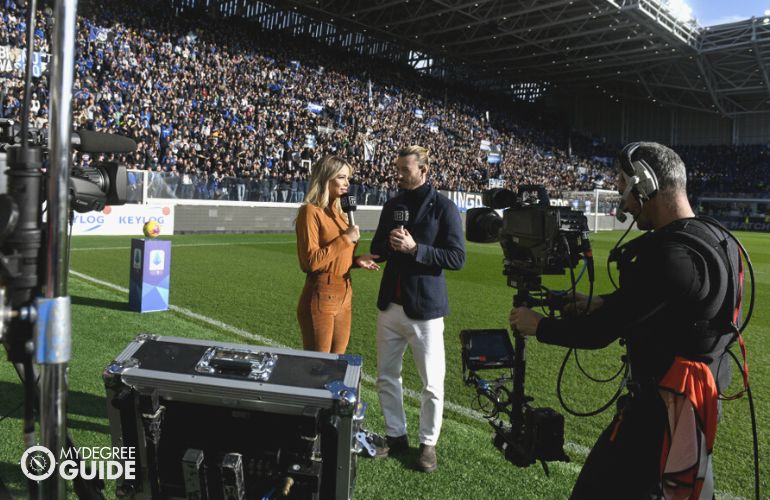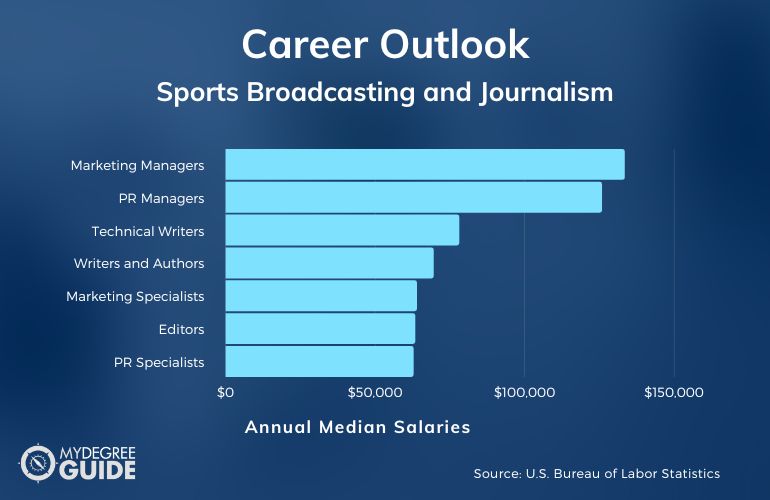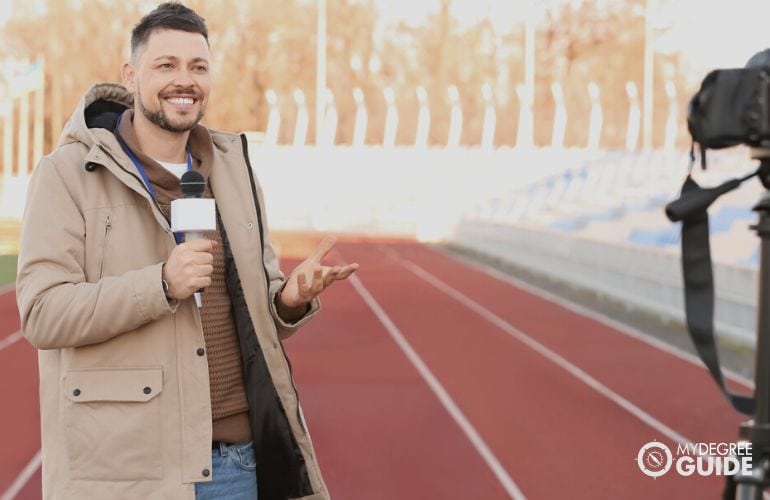A masters in sports journalism combines a passion for athletic events with strong communication and storytelling skills.

Sports media professionals provide analysis and coverage of sports using a variety of digital and traditional media. Individuals working in this field may produce content for local newspapers, podcasts, television, and other media outlets.
Editorial Listing ShortCode:
Enrolling in a master’s degree in sports journalism program could be a strategic choice if you are interested in conducting research and crafting compelling stories about athletes and sports.
Online Masters in Sports Journalism Programs

An online masters degree in sports journalism is a multidisciplinary program that combines methods and theories from communications, journalism, public relations, and other fields.
The field of sport journalism centers on providing insightful coverage of amateur and professional athletics for fans and other audiences. Sports journalists create content on a range of exciting athletics-related topics, such as:
- Critiquing gender and racial inequalities in sports
- Predicting future sports trends
- Profiling up-and-coming athletes
- Providing a historical overview of sports
- Recapping game highlights
What separates sports journalism from other types of journalism? Reporters in this field develop a thorough understanding of athletics, the history of sports, and the organizations and regulations governing sporting events. Because sports journalists often report on live events, it’s necessary to have the ability to produce polished content under tight deadlines.
Editorial Listing ShortCode:
Pursuing a masters degree in sports journalism can allow you to gain communication and technical skills that help you produce original stories about athletics. You may also develop essential interpersonal abilities that can help you in this field, including:
- Collaboration
- Integrity
- Interviewing skills
- Persistence
- Stress tolerance
- Verbal communication skills
Additionally, you can develop a strong knowledge of journalism ethics and practices to ensure that your reporting is accurate, fair, and humane. Curricula will vary by institution and program, but you are likely to study topics such as:
- Broadcast production
- Interviewing
- Journalism ethics
- Media law
- Multimedia communication
- Public relations
- Social media management
- Sports media production
- Sports reporting
- Visual journalism
Many graduate programs also require students to complete internships and practicums. These experiences can offer numerous benefits, such as allowing you to develop a portfolio and providing valuable networking opportunities.
A master’s degree can help prepare you for a variety of careers in sports journalism and the broader communications sector. Positions related to this field of study include:
- Community college professor
- Newspaper reporter
- Production associate
- Social media content creator
- Sports radio show host
- Sports writer
- Television sports broadcaster
Some sports journalists work full-time for corporations and media outlets. Other individuals may work as self-employed freelance reporters.
Sports Broadcasting and Journalism Careers & Salaries

A graduate degree in sports broadcasting and journalism can help prepare you for a variety of career opportunities in media and other fields. Graduates often find employment in these industries, among others:
- Academia
- Advertising
- Broadcast radio
- Digital marketing
- Freelance writing
- Online content creation
- Print journalism
- Television
Your expertise in communications and journalism could also help you qualify for positions in federal and local government institutions, nonprofit organizations, and professional services. According to the Bureau of Labor Statistics, here’s a range of careers related to sports broadcasting and journalism.
| Careers | Annual Median Salaries |
| Advertising, Promotions, and Marketing Managers | $133,380 |
| Public Relations Managers | $125,780 |
| Technical Writers | $78,060 |
| Writers and Authors | $69,510 |
| Market Research Analysts and Marketing Specialists | $63,920 |
| Editors | $63,350 |
| Public Relations Specialists | $62,800 |
| Broadcast, Sound, and Video Technicians | $49,050 |
| News Analysts, Reporters, and Journalists | $48,370 |
| Announcers and DJs | $45,810 |
The Bureau of Labor Statistics predicts that many of these positions will experience average or faster than average job growth in the next few years.
Career paths with positive job outlooks include announcers and DJs (15% job growth), technical writers (12%), public relations specialists (11%), writers and authors (9%), and news analysts, journalists, and reporters (6%). Career opportunities and potential salaries can vary depending on many factors, such as industry, location, skill sets, and years of work experience.
Editorial Listing ShortCode:
You may increase your chances of securing a preferred position by selecting an online graduate program that offers coursework and networking opportunities in the areas that most interest you.
Sports Journalism Masters Curriculum & Courses

Sports journalism graduate programs offer a range of courses that help you gain advanced expertise in journalism ethics, methods, and practices. Each program has its unique curriculum, but you may be required to complete graduate courses similar to the following:
- Art of the Sports Interview: You’ll learn best practices for interviewing subjects and incorporating their testimony into podcasts and other kinds of news.
- Business of Sports Media: You’ll study the business operations that shape sports, along with the relationship between sports business and sports journalism.
- Data Journalism: This course focuses on data analysis and data visualization methods that will allow you to tell innovative, data-driven stories.
- Journalism Ethics: You’ll learn about moral concerns and media laws that impact sports journalists, and you’ll also explore professional practices that will enable you to produce ethical content.
- Media Law: This course analyzes important case laws and provides an in-depth examination of the ways that legal structures influence sports media.
- Online Journalism: You’ll master digital and multimodal techniques that will enable you to create stories for online audiences.
- Opinion and Column Writing: This class teaches you how to construct strong persuasive arguments in opinion and column pieces.
- Sports Broadcast and Production: You’ll learn a variety of skills that you can use in live sports broadcasts or studio show settings, such as script writing and video production.
- Sports Journalism Today: This course examines how sports journalism is evolving to address contemporary social issues and incorporate new technologies.
- Sports Reporting: This class will teach you practical skills that can help you succeed as a sports reporter, such as conducting interviews, pitching stories, and revising your content based on editorial feedback.
These courses will enable you to develop a comprehensive knowledge of communications, journalism, media production, and the sports industry.
Admissions Requirements

Many sports journalism graduate programs have similar admissions requirements, though each application will also have unique elements.
Common admissions criteria include:
- GRE or GMAT scores (only some schools require them)
- Bachelor’s degree in English, journalism, or a relevant field
- Letters of recommendation
- Personal statement about your goals, qualifications, and work experience
- Resume
It’s strategic to always tailor materials like personal statements and resumes to address the requirements and strengths of each program.
Accreditation

Regional accreditation is an important credential that validates the quality of an educational institution. During the accreditation process, an external organization ensures that the school has met certain predetermined standards.
Obtaining an online master’s degree in sports journalism from a regionally accredited school offers many advantages. For instance, employers often prefer graduates of accredited programs because they can trust that the education they received meets expected quality standards.
Editorial Listing ShortCode:
Accreditation can also directly impact your ability to pursue additional education, as most schools will not accept transfer credits from unaccredited institutions. You can visit the US Department of Education’s website to verify a school’s accreditation status.
Financial Aid and Scholarships

A sports communication master’s degree can be a costly investment, but you can explore financial aid resources to try and reduce the upfront costs of graduate school.
Some programs may offer scholarships and tuition waivers to qualified students. You may also apply for scholarships offered by organizations in your field, such as professional sports journalism organizations. Federal and state governments can also provide student loans and work-study options to qualified applicants.
If you plan to work full-time or part-time during your online graduate program, you can see if your current employer provides funding for professional development. To learn more about financial aid opportunities, you can visit the Federal Student Aid website.
Is Sports Journalism a Good Career?

Yes, sports journalism is a good career for many professionals. The Bureau of Labor Statistics predicts that job openings for news analysts, reporters, and journalists will increase by 6% over the next ten years. For many avid sports fans, getting paid to produce content related to their passion is another appealing benefit.
The communication skills that you can hone while completing a graduate degree in sports journalism can also lead to opportunities outside of sports media. For instance, public relations specialists earn a median of $62,800 annually, and the Bureau of Labor Statistics projects 11% job growth for these positions over the next decade.
What Can You Do with an MA in Sports Journalism?

Completing a master’s degree in sports communication or journalism can open the door to a variety of opportunities.
Some professionals work directly in sports media as bloggers, freelance writers, radio broadcasters, or television anchors. These positions could allow you to engage closely with sports fans and provide coverage of athletic events and issues.
Your journalism expertise may also qualify you for careers in the wider communications sector. Some graduates pursue positions such as junior college instructor, digital marketing specialist, or public relations specialist. A masters degree could also help experienced professionals pursue leadership or management roles.
How Long Does It Take to Get a Masters in Sports Journalism Degree Online?

How long it takes to complete an online masters degree in sports journalism will depend on several factors, including your enrollment status and the program requirements.
Typically, a graduate degree in sports journalism will take 1 to 2 years to complete. For example, a 36 credit hour program with no thesis requirement may be completed in 1 year with full-time enrollment, including summer classes.
Editorial Listing ShortCode:
Programs that require a capstone project or thesis often take longer to complete. Additionally, a program will likely take longer to finish if you can only attend part-time.
How Much Do Sports Journalists Make?
The salary that you may earn after completing your sports journalism degree will depend on many factors, including your chosen career path, location, and work experience.
According to the Bureau of Labor Statistics, news analysts, reporters, and journalists earn a median salary of $48,370 annually. The top 10% of earners make more than $120,590 a year. Similarly, announcers earn a median pay of $37,630, with the top 10% of earners netting $103,090.
Related media occupations outside of sports broadcasting and reporting may offer opportunities to earn higher incomes. For example, the Bureau of Labor Statistics reports that public relations specialists earn a median pay of $62,800.
What’s the Difference Between a Masters in Sports Journalism vs. Broadcasting?

There are a few key differences between master’s programs in sports journalism and sports broadcasting. In a sports journalism program, you will:
- Develop interviewing and research skills
- Learn how to create content for digital and print platforms
- Study journalistic ethics and theories
By contrast, a sports broadcasting degree will prepare you to:
- Analyze sports
- Produce telecasts and other forms of live media
- Provide live reports of professional sports
Both types of sports communication masters may qualify you for sports media jobs, but the roles you train for will likely differ. It’s strategic to select the graduate degree that best fits your professional and personal goals.
Is a Sports Journalism Master’s Degree Worth It?

Yes, a sports journalism master’s degree is worth it for many students. The Bureau of Labor Statistics projects 6% job growth over the next ten years for news analysts, reporters, and journalists, which is about as fast as average for all careers.
A career in sports journalism also offers other advantages, including the ability to exercise creativity by producing blogs, radio shows, and other media. Many sports journalists also enjoy getting to engage with fans and work with a topic they love.
Editorial Listing ShortCode:
A masters in sports journalism can also lead to versatile career opportunities outside of sports. Many communication professionals with in advertising, public relations, and broadcasting.
Universities Offering Online Masters in Sports Journalism Degree Program
Methodology: The following school list is in alphabetical order. To be included, a college or university must be regionally accredited and offer degree programs online or in a hybrid format.

Colorado State University offers a Master of Sport Management that can be earned online, typically in just 18 months. There are four tracks to choose from: Generalist, Sport Media and Communications, Business Foundations, and Marketing. The program requires the completion of 30 credits, an internship, and a capstone project to graduate.
Colorado State University is accredited by the Higher Learning Commission.

Emerson College offers an MA in Sports Communication that is mostly on campus, with a few courses available online. To graduate, students must complete a thesis. The curriculum consists of courses such as Emerging Communication Technology, Strategic Planning and the Managerial Process, Project Management and Communication, and more.
Emerson College is accredited by the New England Commission of Higher Education.

Gonzaga University offers an online program for a Master of Arts in Communication and Leadership Studies. The curriculum aims to prepare students for careers in journalism, public relations, marketing, and related fields. The program offers six optional concentrations. Options are Change Leadership, College Teaching, Digital Media Strategies, Global Leadership, Servant Leadership, and Strategic and Organizational Communication.
Gonzaga University is accredited by the Northwest Commission on Colleges and Universities.

Indiana University—Purdue University Indianapolis offers an MA in Sports Journalism. The program requires the completion of 30 credits of coursework but no thesis. Students can usually finish it in 1 to 2 years. Courses are available both online and on campus. The curriculum consists of courses such as Public Affairs Reporting, Media and Society Seminar, and Business of Sports Media.
IUPUI is accredited by the Higher Learning Commission of the North Central Association of Colleges and Schools.

Pace University offers an MA in Communications and Digital Media that can be completed 100% online, typically in just 1.5 years. This 36 credit program includes the option to complete either a thesis or an internship. Students may also choose a concentration in either Social Media and Public Relations or Digital Filmmaking and Media Production.
Pace University is accredited by the Middle States Commission on Higher Education.

Southern Illinois University—Edwardsville offers a Master of Science in Media Studies. Class sizes usually consist of 8 to 15 students, and students can receive personalized advising. Prospective students can apply at any time of the year, but students typically start in the fall. The full program can potentially be completed in just 1 year.
Southern Illinois University – Edwardsville is accredited by the Higher Learning Commission.

St. Bonaventure University offers an MA in Sports Journalism that can be earned 100% online. Students can potentially finish in 1.5 years, or nine 7 week terms. Course possibilities include Journalism Ethics, Business of Sports Media, Art of the Sports Interview, and more. Prior journalism experience is not needed to apply.
St. Bonaventure University is accredited by the Middle States Commission on Higher Education.

Texas Tech University offers an online program for an MA in Mass Communication. The program requires the completion of 30 credit hours and has thesis and non-thesis options. Texas Tech’s online classes follow the same schedule as on-campus classes. Graduates often continue their education at the doctoral level or pursue careers in media, public relations, journalism, or related fields.
Texas Tech University is accredited by the Southern Association of Colleges and Schools Commission on Colleges.

The University of Colorado Boulder offers an online program for an MA in Journalism Entrepreneurship with a specialized track in Sports Journalism. The program requires the completion of 30 credits: nine courses plus a professional project. Core courses are available in either a 15 week, synchronous format or an accelerated, 5 week, asynchronous format.
The University of Colorado Boulder is accredited by the Higher Learning Commission.

Valparaiso University offers a Master of Science in Sports Media that can usually be finished in 18 months. It includes 36 credits of courses such as Sports Media Formats, Legal Environment of Digital Media, Global Leadership and Team Development, and more. Students are also required to complete an internship to gain hands-on experience.
Valparaiso University is accredited by the Higher Learning Commission.
Getting Your Masters in Sports Journalism Online

A master’s in sports journalism can allow you to further develop critical communication and technical skills. Graduates of online sports journalism degree programs are often qualified for a variety of creative and rewarding career paths in sports media, such as freelance writing, live radio broadcasting, and traditional print journalism.
Sports journalism careers can enable you to combine your passion for media production and sports. A journalism degree online or on campus at the masters level in the field may also prepare you for senior or leadership roles.
If you think a career in sports journalism could be the right fit for you, you can start exploring accredited universities today to find the online masters in journalism programs that best align with your goals and interests.

